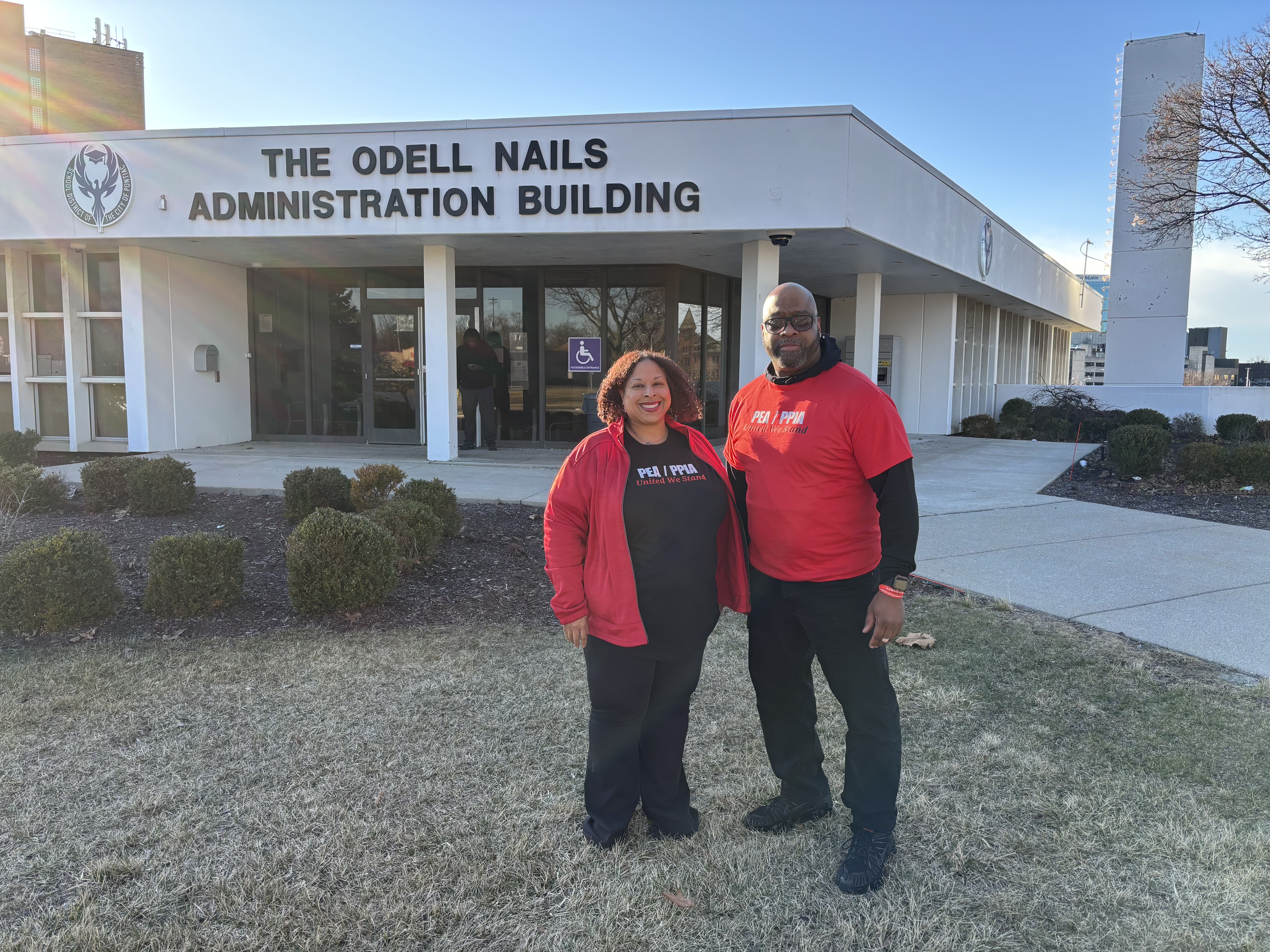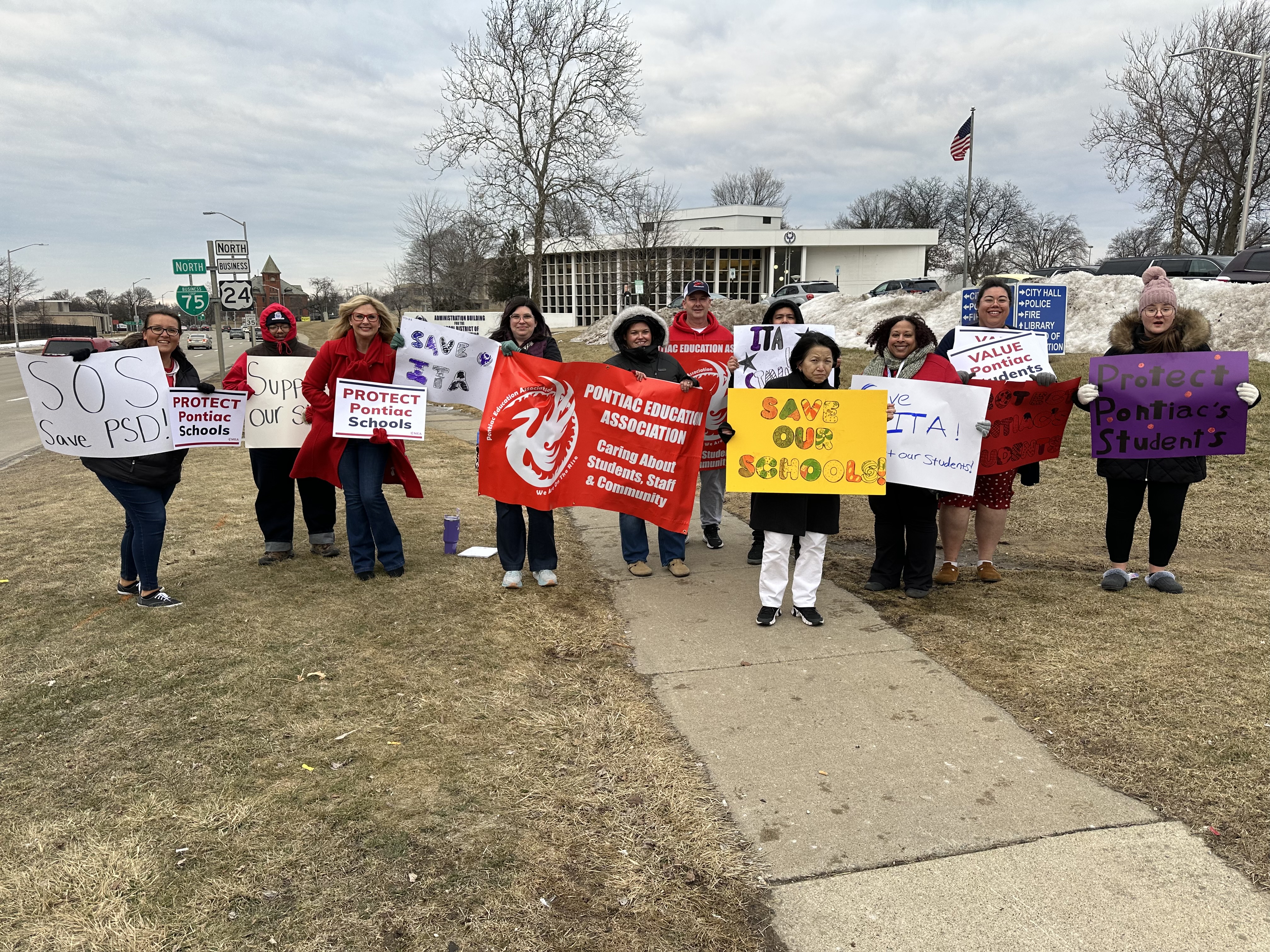Pontiac unions join forces in crisis
By Brenda Ortega
MEA Voice Editor

and Paraprofessionals associations, are collaborating to build strength.
Teacher Candice Ridley first noticed the organizing talents of paraeducator Fred McFadden several years ago while taking part in collective action during a staff convocation to start a new school year in the Pontiac School District where both work.
In the audience, Ridley and other staff members all remained silent through administrators’ speeches to show solidarity and send a message to school board members in attendance about concerns going unaddressed despite sacrifices employees had made to help shore up the district.
The superintendent ended her talk by chastising staff for the protest, so when McFadden – a local union leader – took the stage, he abandoned plans to stay silent and instead spoke out.
“Fred gave such a rousing speech, that’s when we all came to life and started cheering and clapping,” Ridley said. “I liked how he talked; I liked how he acted; I liked what he was saying. I knew I could learn a lot from him.”
McFadden remembers. When the district’s top leader blamed staff, “I looked at the other (unit) presidents, and I said, ‘I know we said when we get on stage we were not going to say a word—and I know my grandmother would come out of heaven and pop me on my head to tell me, you better respond to that.’”
Over the next few years, as Ridley took on a role as minority representative on the executive board of the Pontiac Education Association (PEA), she got to know McFadden, president of the Pontiac Paraeducators Association.
When she became PEA president in 2023, “we joined forces immediately,” Ridley said. “We realized we needed to support each other. We have the two biggest units in our district, so it makes sense for us to work together instead of working as separate entities.”
Their partnership solidified at a key time as the central Oakland County district has faced a simmering crisis this school year. Educators in Ridley’s unit have been working without a contract since the last agreement expired June 30. District officials didn’t even begin negotiations until July.
Then tensions dialed up in recent weeks after Ridley and McFadden attended a late February school board retreat where a draft plan to reorganize the district was discussed, which laid out a quick timeline for approval and implementation.
Titled “Pontiac Schools Reimagined,” the unreleased plan was developed without input from the staff or community, she said. Ridley took photos of slides being presented and emailed the information to union members later that day.
The plan called for closing one school and two district facilities, restructuring elementaries to cluster students into buildings by grades, and relocating two honors programs now housed together, the K-5 International Language Academy (ILA) and 7-12 International Technology Academy (ITA).
“These are sweeping changes being proposed that would fundamentally reshape our district without proper transparency or stakeholder involvement,” Ridley said. “We had little time to respond.”
Soon the plan and its timeline were shared on the local union’s social media, along with a call to action for school employees and community members to show up for the next school board meeting on March 3. Local news outlets were alerted, and more than 100 people turned out.
Interim Superintendent Kimberly Leverette told news reporters the union leaders were giving out “misinformation” but later called the plan a “well-researched possible way to structure our district in a way that will be fiscally responsible, given the uncertain funding and educational climate.”
Ridley said she simply shared slides from the retreat. “They wanted to vote on it March 17 and wait till March 31st to say anything to the public. I reported out to my membership what was going on. It was a two-day retreat, and I gave updates, and they accused me of sending out misinformation.
“How is it misinformation when I’m quoting what’s on your slides?”
The unions are raising questions about district spending on upper management while teachers and other certificated staff are working without a contract. In addition to Leverette, the previous superintendent went on paid administrative leave in January 2024 and returned as “superintendent emeritus” in 2025.
The two superintendents along with two additional management consultants are being paid more than $600,000 from this year’s budget—“and then they cry poverty,” Ridley said.

board meeting, including MEA President Chandra Madafferi (third from left).
In addition, a major concern is the background of one of the high-paid consultants advising the board: Donald Weatherspoon previously worked as an emergency manager appointed by Gov. Rick Snyder to oversee financially troubled school districts.
Weatherspoon was the emergency manager who transitioned Muskegon Heights Public Schools into the nation’s first fully privatized school system in 2012, turning over the keys to a for-profit school management company which has since changed several times again.
He later took over the Highland Park School District—which had similarly been privatized under a previous emergency manager—and closed the only high school, leaving students in grades 9-12 to travel miles into neighboring districts for education. He also worked in Benton Harbor and Pontiac as a consent agreement consultant with less sweeping powers to make changes.
Described as “the legend” in an interview with the National Charter Schools Institute, Weatherspoon was listed as a presenter at a 2019 conference of the Michigan Association of Public School Academies for a session titled “Charters as change agents, forces for quality, and catalysts for excellence.”
Meanwhile, many residents in a number of mostly Black communities where public schools were closed or privatized now wish they’d fought harder to protect what they had, McFadden said, adding he doesn’t want his hometown to suffer the same fate.
Well-known in Pontiac for helping lead the city’s Special Olympics basketball team to nine state championships, McFadden serves on the MEA Board of Directors and the Education Support Professionals Caucus.
“I’ve been a president a long time, and I know Dr. Weatherspoon,” McFadden said. “I know his history. We are trying to get answers from the board to three questions: Why did you bring Dr. Weatherspoon in? Did you know him before you brought him in? Did you vet him?”
The district’s enrollment and finances have begun to stabilize in recent years, but Ridley and McFadden realize challenges remain that must be addressed. What they want from the district is transparency and collaboration.
So far they believe they’ve been able to slow down the process. At the March 3 school board meeting, a flyer was released announcing dates and locations for community listening sessions over several weeks, and the March 17 meeting came and went without a vote on the draft plan.
However, at its April 7 meeting, the school board began discussing a preliminary new plan with some revised elements — such as retaining the ITA program and merging it with the language immersion program — plus some pieces remaining from the original plan and other parts still up in the air.
Yet a hurried timetable for approval again is being considered, Ridley said. “They revealed the details of the new plan last night (April 14) at an unrecorded meeting, and the new plan will be voted on April 28 — again without the public having a chance to see and speak on it.”
Parents and staff alike are worried about unpopular proposals in the plan which could lead families to leave the district for neighboring schools of choice and undo years of work to get Pontiac schools on stronger footing, Ridley said.
“Our parents are passionate about their schools; they have the power, and they’re exercising it by calling and emailing and coming to board meetings. They’re showing up to say, ‘We are paying attention. Don’t do this. Schools are the backbone of the community.’”
It’s also why the coming together of union members is so important right now, McFadden said: “This may be David vs. Goliath, but they can’t operate without us. No more division. No more letting them pit one against the other. If we work together, we can all win.”



